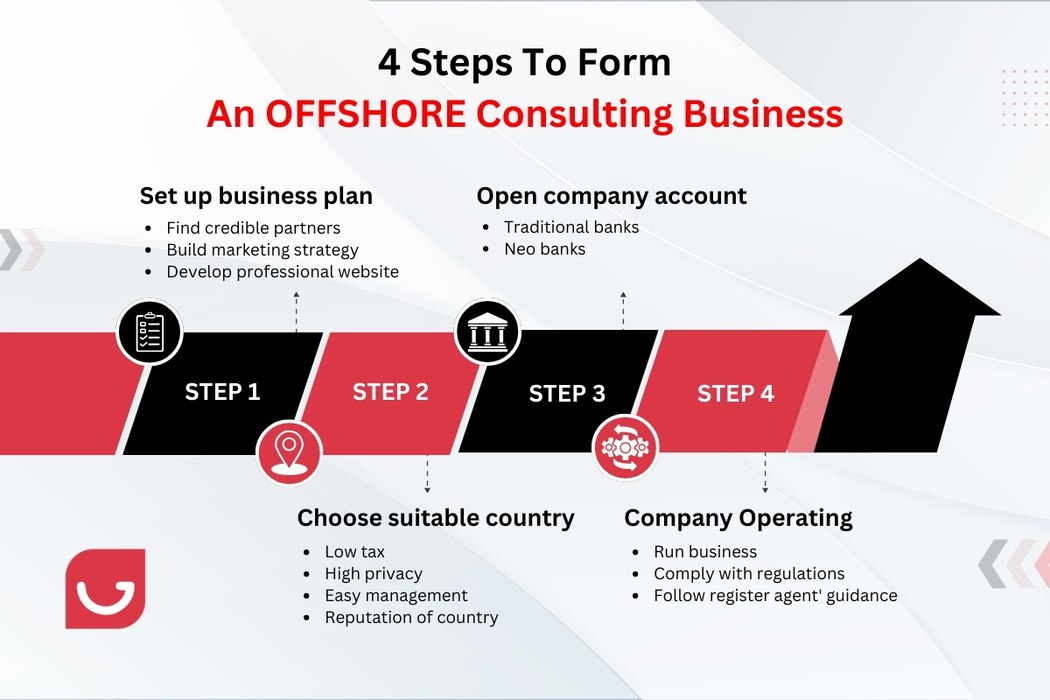Offshore Company Formations Next-Gen Changes: What International Investors Should Watch
Debunking Offshore Company Formations: Just How They Operate and What to Expect
Offshore firm formations can seem complex and enigmatic. Offshore Company Formations. These entities, commonly established for tax obligation advantages and privacy, operate under distinct legal frameworks. Business owners may find themselves navigating with a labyrinth of policies and compliance needs. Recognizing the ins and outs is essential for success. What are the actual benefits? What are the prospective mistakes? A closer examination exposes the nuances that can impact decision-making substantially
Recognizing Offshore Companies: Kinds and meanings
Offshore firms are entities established in a jurisdiction outside of a person's or company's key country of house, often for objectives connected to tax obligation optimization, possession security, or regulative benefits. These business can take various kinds, including limited liability firms (LLCs), worldwide company firms (IBCs), and offshore depends on. Each type offers specific features and allures to different needs.
Restricted obligation business offer owners with protection from personal liability, while international business companies are preferred for their flexibility and minimal coverage demands. Offshore depends on, on the various other hand, are utilized largely for estate planning and property defense.
The option of jurisdiction considerably influences the company's procedures, as some locations offer more desirable lawful frameworks and privacy protections. Offshore Company Formations. Understanding the distinctions in between these types is essential for businesses and individuals taking into consideration offshore frameworks, as each alternative carries different effects for administration and compliance
The Advantages of Developing an Offshore Business
Establishing an offshore business can supply many benefits, particularly for those seeking to improve their monetary approaches and protect their assets. One substantial advantage is tax obligation optimization; lots of territories use desirable tax obligation rates or exemptions, enabling companies to retain even more profits. In addition, offshore firms can give a layer of personal privacy, securing the identifications of proprietors and shareholders from public analysis.
Another benefit is asset security. By positioning assets in an overseas entity, individuals can guard their wealth from potential lawful cases or political instability in their home nations. This framework likewise promotes global service procedures, making it possible for easier access to varied clientele and worldwide markets.
Furthermore, the establishment of an offshore business can improve credibility and stature, interesting customers who value global company practices. Overall, these advantages make offshore company formations an appealing alternative for services and individuals going for economic growth and safety and security.
Key Factors To Consider Prior To Forming an Offshore Entity
Before creating an offshore entity, numerous vital elements need to be analyzed. Legal compliance needs, tax obligation effects and benefits, as well as jurisdiction choice, play a considerable duty in the decision-making procedure. Recognizing these considerations can assist people and services navigate the complexities of offshore business formations properly.

Legal Compliance Demands
When considering the formation of an overseas entity, comprehending legal conformity demands is vital to assure adherence to both global and regional laws. Possible entrepreneur must acquaint themselves with regulations governing company enrollment, reporting responsibilities, and operational standards in the picked jurisdiction. This consists of confirming the lawful needs for directors and shareholders, as well as making sure conformity with anti-money laundering (AML) and know-your-customer (KYC) policies. Additionally, organizations must continue to be knowledgeable about any type of licensing demands details to their industry. Involving neighborhood lawful and monetary experts can give useful insights, making sure that all essential paperwork is prepared and submitted properly. Eventually, complete expertise of lawful compliance helps minimize dangers and cultivates a lasting overseas operation.
Tax Ramifications and Benefits
Various company proprietors think about the tax obligation effects and benefits of creating an offshore entity as a critical aspect in their decision-making process. Offshore companies can supply considerable tax obligation advantages, such as lowered corporate tax rates, exception from specific regional taxes, and the capacity to delay taxes on international income. These advantages can bring about boosted productivity and cash money flow, making overseas frameworks appealing for worldwide business procedures. Additionally, the potential for tax obligation treaties may even more lessen tax obligation responsibilities. However, it is essential for service proprietors to comprehend the complexities involved, including compliance with both global and neighborhood tax obligation laws. Engaging with tax experts is suggested to browse these ins and outs effectively and ensure perfect tax obligation planning strategies.
Territory Choice Variables
What aspects should one consider when choosing a territory for overseas business formation? Key considerations consist of tax obligation performance, governing environment, and political security. Jurisdictions with beneficial tax obligation regimes can greatly influence productivity. The regulative landscape needs to offer adaptability and convenience of compliance, enabling reliable business procedures. Political security is crucial, as it guarantees the safety and security of properties and continuity of procedures. Additionally, the credibility of the territory can impact customer depend on and service relationships. Ease of access to banking services and the schedule of specialist support services are likewise crucial. Understanding neighborhood laws regarding reporting, personal privacy, and possession demands is necessary to establish that the overseas entity lines up with the service owner's objectives and legal obligations.
The Refine of Establishing an Offshore Firm
Establishing an offshore business includes a series of tactical steps that need mindful planning and compliance with international regulations. A specific need to choose a suitable territory that straightens with their service goals and supplies positive tax obligation advantages. Adhering to territory choice, the following action is to select a distinct business name and prepare the needed paperwork, including short articles of consolidation and shareholder agreements.
When the documentation prepares, it must be sent to the relevant authorities together with the required fees. After approval, the company will get a certificate of unification, officially establishing its lawful existence. The individual should then open a business financial institution account to facilitate monetary purchases.
Lastly, preserving an offshore company involves sticking to recurring compliance needs, such as annual reporting and tax responsibilities, which vary by territory. Understanding each step is important for an effective overseas business formation.

Regulatory and legal Framework for Offshore Companies
While developing an overseas firm can offer considerable advantages, it is vital to navigate with the complex legal and governing framework that regulates such entities. Each jurisdiction has its own set of laws that dictate whatever from business formation to taxation and compliance requirements. These laws are developed to avoid prohibited activities, such as cash laundering and tax evasion, and typically require comprehensive documentation and openness.
Key elements of this framework include the need of assigning local directors, preserving a registered workplace, and sticking to annual coverage obligations. Additionally, several territories enforce details licensing demands for sure company activities. Understanding these lawful stipulations is essential for making sure conformity and mitigating risks connected with fines or lawful disputes. Engaging with legal professionals who specialize in offshore companies can help in navigating with this complex landscape, inevitably assisting in a compliant and successful overseas organization operation.
Typical Mistaken Beliefs Regarding Offshore Companies
Many individuals hold false impressions concerning overseas companies, often corresponding them with tax evasion and prohibited tasks. However, it is very important to recognize that these entities can operate legally within a structure developed for reputable service techniques. Clearing up the legal status of offshore business can aid dispel these myths and advertise a more exact understanding of their function.
Tax Evasion Misconceptions
Regardless of the expanding popularity of offshore business, mistaken beliefs regarding their usage for tax obligation evasion continue. Several people wrongly think that developing an overseas entity is exclusively a method to stay clear of tax obligations. Offshore companies are typically utilized for genuine functions, such as possession security, global company growth, and financial investment diversification. The assumption that all overseas tasks equate to illegal tax evasion overlooks the complexities of worldwide tax obligation guidelines and compliance requirements. Additionally, the vast bulk of overseas jurisdictions have implemented measures to fight tax obligation evasion, promoting openness more info here and information exchange. This mischaracterization can discourage legit services and capitalists from discovering the possible benefits of offshore business formations while continuing an unfavorable stigma bordering these entities.
Legal Condition Clarified
The lawful status of overseas business is usually misinterpreted, causing a selection of misconceptions. Lots of believe these entities run in a lawful grey location, presuming they are unethical or inherently illegal. In reality, offshore companies are legitimate businesses created under the laws of certain territories, made for different factors, including possession protection and market expansion. An additional typical mistaken belief is that offshore companies escape taxes entirely; nevertheless, they undergo the regulations and tax obligations of their home countries. Furthermore, some individuals think that offshore firms can be easily made use of for money laundering or prohibited tasks. While misuse can take place, most territories impose strict compliance and openness laws to alleviate such risks, guaranteeing that offshore companies operate within legal frameworks.

Handling and Running Your Offshore Firm Successfully
Successfully managing and operating an offshore firm calls for a calculated approach that balances compliance with local regulations and the quest of service goals. Effective offshore management includes comprehending the jurisdiction's tax laws, reporting needs, and operational guidelines. Using regional professionals, such as accountants and legal consultants, can offer very useful insights right into traversing these intricacies.
Furthermore, developing clear communication channels and functional procedures is important for keeping performance. Making use of innovation for task monitoring and partnership can improve productivity, while normal performance reviews guarantee placement with calculated purposes.
Furthermore, keeping robust economic documents is important, as transparency promotes depend on with stakeholders and complies with worldwide criteria. Ultimately, being versatile to changes in regulation or market problems enables overseas firms to pivot effectively, ensuring long-term sustainability and growth. By sticking to these principles, company owner can make best use of the benefits of their offshore ventures while mitigating dangers.
Often Asked Inquiries
Just how much Does It Price to Preserve an Offshore Business Each Year?
The expense to preserve an offshore business every year differs considerably, generally varying from $1,000 to $5,000, depending upon jurisdiction, services called for, and compliance responsibilities. It is important to think about added costs for details demands.
Can I Open a Checking Account for My Offshore Firm Remotely?
Opening a checking account for an offshore firm from another location is normally feasible. Needs may vary by territory, commonly necessitating documentation and verification processes, which can complicate the remote application experience for people.
Exist Specific Countries Understood for Easier Offshore Business Formations?
Specific countries, such as Belize, Seychelles, and the British Virgin Islands, are renowned for their structured procedures and positive laws concerning overseas business developments, drawing in business owners seeking efficiency and privacy in organization operations.
What Types of Companies Are Ideal Suited for Offshore Business?
Specific companies, such as ecommerce, investment, and working as a consultant companies, usually take have a peek here advantage of offshore business because of tax advantages, personal privacy, and governing adaptability - Offshore Company Formations. These entities normally flourish in jurisdictions that advertise positive organization settings
How Can I Guarantee Conformity With Regional Legislations When Operating Offshore?
To guarantee conformity with neighborhood laws when running offshore, it is important to engage legal specialists, conduct thorough research study on jurisdiction guidelines, and preserve transparent monetary documents, consequently lessening dangers related to non-compliance.
